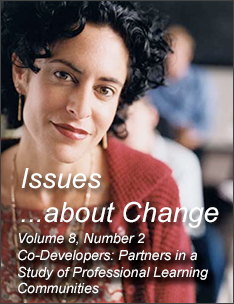Colleagues in the Professional Learning Community of Co-Developers
The thirty Co-Developers first came to Austin in November 1997 for an overview of the three-year project and an introduction to the concept of the PLC. This initial meeting, in particular, tested the courage of participants' conviction, as they came to understand that they had volunteered for a journey for which no map existed. At these early meetings especially, but also throughout the project, SEDL provided research (both their own and that of others) that communicated the power of schools as communities of learners. SEDL also engaged Co-Developers in deep dialogue that led them to share and develop their vision of school improvement through PLC structures and relationships and to recognize the potential for increased student learning through such structures and relationships.
Through learning experiences and interactions such as these, Co-Developers gained both an intellectual understanding of the dimensions and benefits of PLCs, and an increasing personal experience in belonging to a PLC. Furthermore, all SEDL meetings and conferences with the group included varied opportunities for Co-Developers to interact with one another to help them develop strong professional relationships that would sustain them in their work ahead.
Subsequent meetings throughout the first six months of the project were designed primarily to prepare Co-Developers for their work in the field. At the second meeting of Co-Developers, in January 1998, SEDL asked Co-Developers to join with them in identifying the knowledge, skills and understandings (proficiencies) that would prepare them as external facilitators to help schools develop as PLCs. These proficiencies would be useful in carrying out their role as external facilitators and field-based developers in schools they selected for the project.
Because each Co-Developer came to the project with unique and valuable knowledge and skills in working with schools, the task of teaching the proficiencies so that all had needed skills was largely assumed and led by Co-Developers themselves. Such experiences in which Co-Developers looked to their colleagues as resources for their own growth and development further strengthened the sense of community within the group while simultaneously helping them to become more knowledgeable and proficient as external facilitators.
Four-day meetings in March and in May of 1998 provided opportunities for these "resident experts" to train themselves in various proficiencies identified as necessary in their work. Co-Developers with knowledge and skills about particular proficiencies shared their personal expertise with their colleagues as a means to increase the expertise of the whole group. Examples of these proficiencies were skills in data collection and analysis, dialogue, team building, overcoming resistance, and developing a vision.
Utilizing Co-Developers as "resident experts" in the various proficiencies modeled shared leadership, highlighted the often hidden capacities of individuals in the group, and provided opportunities for collective learning on the part of all participants. In addition, with Co-Developers' input and advice at these early meetings, SEDL staff developed mechanisms and processes for compiling and reporting data that Co-Developers were to collect at their schools.
Throughout this period, SEDL provided the Co-Developers continuing opportunities to engage in deep and ongoing dialogue about the five characteristics of PLCs and their potential for school improvement. These conversations helped the Co-Developers develop a clearer and more unified vision of what a PLC would look like, what a staff in such a community would do, and how they would interact in such a setting.
This opportunity to dialogue also served to increase Co-Developers' commitment to the project and to deepen their appreciation and respect for one another. As Co-Developers came to know and trust one another through learning experiences, and, later, to relate their stories of success and struggle in their schools, they increasingly sought opportunities to share their personal practice with Co-Developer colleagues.
Next Page: External Facilitators and Field-Based Developers in their Schools

